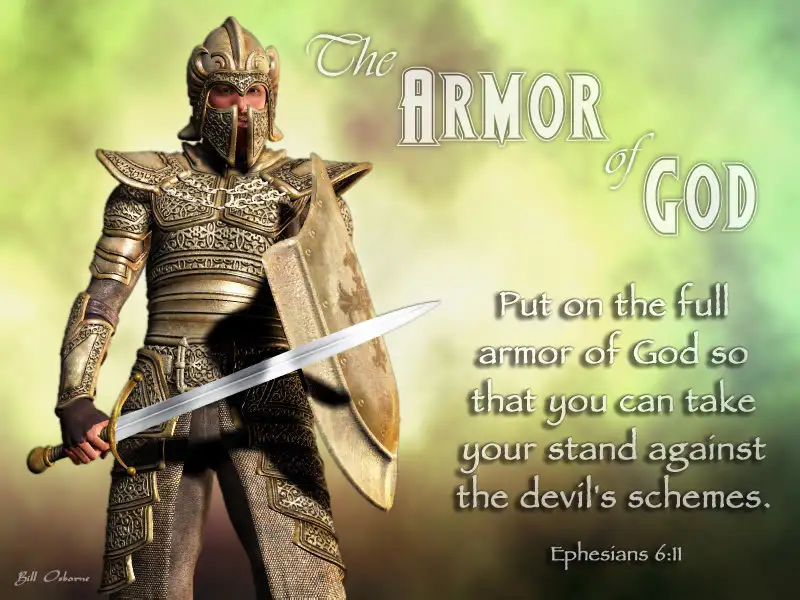THE SEED
And take the helmet of salvation, and the sword of the Spirit, which is the word of God. Ephesians 6:17
We also need the protection offered by the “helmet of salvation” against evil thoughts. The “helmet of salvation” is the insurance that as long as we are totally surrendered to the Lord, living in obedience to Him, we cannot lose our salvation. Therefore, let us not hesitate to resist the lies of the enemy by which he attempts to make us doubt the love and salvation that we have in Christ Jesus. The following are some of the best Bible verses that we can use to “put on the helmet of salvation” in spiritual warfare: “My sheep hear My voice, and I know them, and they follow Me. And I give them eternal life, and they shall never perish; neither shall anyone snatch them out of My hand. My Father, who has given them to Me, is greater than all; and no one is able to snatch them out of My Father’s hand” (John 10:27-29). The Word of God becomes an effective “sword” for the one who learns and applies it. The Scripture is the truth, and when we apply it under the guidance of the Holy Spirit, we can defeat the lies and deceptions of the enemy and even of our own carnal nature. The proclamation of the Word of God has power and strengthens our faith.
BIBLE READING: JOHN 10
PRAYER: Please help me to always surrender it all unto You, to live to please You in all I am and do, so that I will never want to leave from the palm of Your hand. I can be sure of my salvation every time I proclaim God’s Word in the Name of Jesus. Amen.
AṢIBORI IGBALA ÀTI ÌDÁ Ẹ̀MÍ
IRUGBIN NAA
Ẹ mú àṣíborí ìgbàlà, àti idà Ẹ̀mí, tí iṣe ọ̀rọ̀ Ọlọ́run; Efesu 6:17
A tún nílò ààbò tí “à pèsè lòdì sí àwọn èrò ibi. “Àṣíborí ìgbàlà” jẹ́ ìdánilójú pé níwọ̀n ìgbà tí a bá ti fi ara wa sílẹ̀ pátápátá fún Olúwa, tí a ń gbé ní ìgbọràn sí i, a kò lè pàdánù ìgbàlà wa. Nítorí náà, ẹ má ṣe lọ́ra láti kọjú ìjà s’áwọn irọ́ ọ̀tá, èyí tí ó fi ńgbìyànjú láti mú wa ṣ’iyè méjì nípa ìfẹ́ àti ìgbàlà tí a ní nínú Kristi Jésù.Iwọnyi ní ẹsẹ bíbélì tí o dára jù tí a lè lo, ki a to le lo àṣíborí ìgbàlà” nínú ogun tẹ̀mí ji ja. “Àwọn àgùntàn mi ń gbọ́ ohùn mi, èmi sì mọ̀ wọ́n, wọ́n sì ń tọ̀ mí lẹ́yìn. Mo sì fún wọn ní ìyè àìnípẹkun, wọn kò sì ní parun ; kò sì sí ẹni tí ó lè já wọn gbà kúrò lọ́wọ́ mi. Baba mi ti o fí wọn fún mi, Tobi ju ohun gbogbo lọ; ko sí sí ẹni tí o le j’awọn gba ní ọwọ Bàbá mi. ( Jòhánù 10:27-29). Ọ̀rọ̀ Ọlọ́run di “idà” tó múná jọ́jọ́ fún ẹni tó ba kẹkọ ninu rẹ, ti o sí fí sí ojúṣe. Otitọ ni iwe mimọ, ati pe nigba ti a ba lo o labẹ itọ sọna ẹmi mimọ, a le ṣẹgun awọn irọ ati ẹtan ti awọn ọta, ati paapaa ti ẹda ti ara wa. Ìkéde ọrọ Ọlọrun ní agbára, ó sì ń fún ìgbàgbọ́ wa lókun.
BIBELI KIKA: Johanu 10
ADURA: Bàbá jọwọ ran mi lọwọ lati fi gbogbo mi fun Ọ, lati máà gbé ìgbé ayé tí yíó wu Ọ ninu ohun gbogbo ti emi nṣe, ki emi ki o ma baa lọ kuro ni atẹlẹwọ rẹ. Mo ni idaniloju igbala mi ni gbogbo igba ti mo ba kede ọrọ Ọlọrun ni Orukọ Jesu. Amin.
